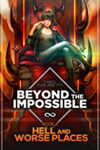The scribe and the goddess
Saqqara, Egypt
2630 BC
During the day, the construction site is always busy: hundreds of people transporting the blocks of stone that will one day become Egypt’s first pyramid. But tonight the place is eerily silent, illuminated only by the light of torches.
A woman approaches the tent of the Chief Architect. Her path is blocked by two guards, who cross their spears to prevent her from going forward.
<Go away, woman. Obviously someone already had fun with you> one of the guards tells her, looking at her pregnant belly already showing through the loose white garments.
<I was summoned by the Chief Architect. And you better show some respect to the Chief Physician, or I will have you executed> she replies sternly, showing them the roll of papyrus signed with very familiar hieroglyphics.
One day Merit-Ptah will be remembered by history as the first known female physician, but such a future is inconceivable for her as much as her intelligence is unbelievable for the guards.
She doesn’t give them more attention as she proceeds into the tent; inside the palace she may receive the respect she deserves, but outside she’s just a woman.
Which is one of the reasons why she likes working with Imhotep: the man may be a genius, but he seems completely oblivious to her gender. He doesn’t even acknowledge her arrival; instead, he’s contemplating a large block of black stone full of symbols Merit-Ptah doesn’t recognize.
There’s a table next to him, and under a white blanket there’s clearly the body of an adult female.
<Why did you summon me, Imhotep?> she finally asks, annoyed at his theatrics.
He turns slowly. He’s still relatively young, though in the twenty years of his life he’s accomplished more than any other commoner she knows.
<I require your medical expertise, Merit-Ptah. As much as it pains me to admit it, I have stumbled upon a truly unique mystery that even I can’t solve alone.>
<I assume that’s why there’s a dead body in your tent?>
<I didn’t choose this place to build Djoser’s future resting place by accident, Merit-Ptah. I’ve known for some time that there is a very ancient tomb beneath our feet, and I needed an excuse to excavate.>
<So? This is Egypt. We find tombs all the time.>
<I believe this came from a much farther land> Imhotep says, removing the blanket.
Merit-Ptah quickly takes a step back, screaming:
<Eye of Horus!!! What kind of monster is this!?>
The woman on the table appears to be dead, but that’s not what scared the physician. As humanoid as she looks, she’s clearly something else.
Her skin is ash grey, and while it’s for the most part smooth there are several patches covered by reptilian scales. She doesn’t have a navel and her scalp has been surgically removed, now standing on the table with her very long white hair.
<She can’t do you any harm: as you see, she’s dead. But this is a very peculiar cadaver: I can’t find evidence of treatment, but her body has resisted decomposition for a very, very long time.>
<Perhaps the way she was embalmed turned her skin grey> Merit-Ptah suggests, touching the dead woman and examining her further. Tissues and organs haven’t softened: she doesn’t look like a dead person at all. Just a beautiful woman sleeping.
<There is something else. I had to look inside, and I found this> Imhotep says, inviting Merit-Ptah to examine the inside of the corpse’s head. She immediately notices that the brain doesn’t look human; what’s more, there is something lodged inside it. Something metallic.
<It’s like this object slowly grew inside her> Merit-Ptah says, very slowly touching the object.
Suddenly it glows. Merit-Ptah screams, terrified by the view, while Imhotep shoves aside the pregnant woman and digs his hands inside the brain.
A circuit closes. Without any warning, a massive lightning strikes the tent and goes straight for Imhotep. He screams, his nervous system overloaded by the sudden stream of information that he’s receiving. It last just seventeen seconds, but it’s an eternity for anyone.
When it stops, the metal device has disappeared and the alien’s brain has been liquefied. Merit-Ptah and the guards approach him to see if he’s alright, and he smiles.
He opens his eyes, which are now silver. And they shine with pride.
2600 BC
Djoser may still be the Pharaoh, but even he doesn’t question Imhotep’s methods. His decision to reside in a small and unassuming house instead of the royal palace was the source of some scandal in the court, but few dared to voice their doubts. After all Imhotep is known as the wisest man in the land, and all those who oppose him have the tendency to disappear without leaving a trace.
People keep their distance from the fifty year old man as he approaches his home. Only when he’s absolutely sure to be alone, he orders out loud:
<Open. Security code 86B787B50613A-PTAH.>
There’s a beep and a secret panel opens. Imhotep walks inside his secret laboratory, and it would be easy to believe he’s left Ancient Egypt altogether. The screens still use cathode rays and the computers are operated by knobs and switches, but otherwise it’s remarkably similar to a state-of-the-art 21st century lab. The screens show things that would be incomprehensible to people of this era: aerial photographs of the major cities, charts of stars invisible to the naked eye, a three-dimensional view of human DNA, and a picture of an elderly Merit-Ptah.
<She seems like a remarkable human> someone behind Imhotep says. He immediately goes for the magnetic crossbow mounted on the wall and takes aim at the intruder.
She’s a tall woman with fair skin and long blonde hair, wearing a bronze armor that exalts her very feminine figure. She has a helmet over her head, and her eyes are grey.
<My name is Athena, Imhotep. I know you have heard of me.>
<The only Athena I know is a minor goddess worshipped by northern barbarians> he explains, firing the crossbow. The metal arrow is propelled at the speed of sound by a magnetic force; it’s enough to kill an elephant in one show, but she catches the arrow before it reaches her breastplate.
<You know much more than that, Imhotep. In fact, you know everything about this planet: the collective consciousness of all the 70 million mortals on this planet is yours to exploit, isn’t it?>
<Let us assume you really are the barbarian goddess. What do you want from me?>
<You found something I was looking for: a Drylon device called the Nexus. I’ve owned several in the past and used them on many, many mortals…but none of them have survived as long as you, or have kept such a low profile. I want to know why.>
<I work better in the shadows. I could take over this world tomorrow if I wanted to, but I have no interest in ruling over inferior minds. What I seek… is knowledge.>
<Then you’re wasting time staying on Terra. I have a job to offer you, Imhotep…>
Knossos, 12 light-years from Earth
2530 BC
Imhotep looks at the destruction around him, leaning on his cane. His technology has lessened the effects of time on his body, but he feels each and every one of his 120 years.
From atop the ruins of the capital’s palace, he can see the city in flames and the incinerated spaceships raining down on the radioactive craters.
Two women catch his attention, descending from the heavens. One of them has green hair and a scandalously revealing dress, while the other has red hair and seems disgusted by what she sees.
<Demeter, was this really necessary?>
<A goddess can’t appear weak before her subjects, Hestia. When Knossos decided to rebel against my rule, they should have known what that would bring.>
The two goddesses look at the elderly Egyptian; Demeter with smug superiority, Hestia with pity.
<Are you alright? Radiation is not good for mortals.>
<Serves him right. He supplied these primitives with atomic weapons, and now he will die.>
<It’s only the beginning, Demeter. Knossos may have fallen, but the war has just begun> Imhotep explains, pointing his finger at the sky… where a contingent of robots is invading Knossos.
<Hephaestus, you crippled bastard! You won’t have any of my worlds as long as I am alive!>
Demeter takes flight, throwing herself against an entire army that stands no chance against a daughter of Kronos. Hestia, however, hesitates.
<All this chaos and destruction… you must have known Demeter would let Knossos burn before she would agree to mortal rule. Why choose this way?>
<You are smarter than most people believe, Hestia. How long do you think the war between Demeter and Hephaestus will last? A thousand years? Two thousand? Like I said: it’s just begun.>
<Then why do I get the feeling you’re playing a much longer game?>
<When we see each other again, you will know> Imhotep answers, disappearing in the show of lights typical of a teleportation device.
The Dark Pyramid, today
Imhotep looks much younger than four thousand years ago. He’s sitting on his throne before Vesta, now trapped by chains of neutral matter. Noriko Null, Quantum, Torn and Kristen Lynn have heard his story, although the latter has a really hard time believing any of it is real.
<My body died of radiation poisoning shortly after that; I have been transferring my consciousness from one cloned body to the other for much of Earth’s recorded history> Imhotep explains.
<And you sold your services to Dionysus. So much for all your rhetoric about mortal rule> Vesta notes.
<Hardly; I have manipulated the gods to reach my goals. Demeter was technically the owner of Earth when I was born… though she called it Terra… but the constant state of war with Hephaestus that I engineered kept her away long enough for Athena to arrange the arrival of the Palladium to this planet, shielding it permanently from the rest of the galaxy.>
<And creating the Guild to rule the Dionysus sectors helped marginalize his importance in galactic matters. Who came up with that, you or Athena?> Noriko asks him.
<I did, of course, but I wouldn’t be surprised to learn she anticipated that I would.>
<This is all very interesting, Scribe, but I’m betting you didn’t bring me here alive just to gloat about your evil plan. What do you really want from me?> Noriko asks, her silver eyes shining.
<Although I have used the Nexus for much longer than you, I will admit you can use it to a much greater extent; perhaps because Earth’s population is much larger now, or because it was inactive for so many years inside your brain before Athena reactivated it. Whatever the reason, Noriko Null, I have returned to take back the Nexus.>
<Then why did you get rid of it in the first place!?>
<I couldn’t move it to my clones, because the transfer kills the host: I’ve seen it first hand when I took it from the dead Emissary, and you have studied its effects on your clone.>
<“Emissary”? Like the Grey Lady we met in Hell… there’s more?> Quantum wonders.
<The Nexus is mine, Scribe. I will die before I let anybody else get their hands on it.>
The Scribe leans on his throne, amused by the situation. He flips a switch hidden under one of the armchair, and the throne starts to change its shape almost too rapidly for the naked eye.
The metal twists and turns around him, gathering material from the rest of the room, forming an armor piece by piece. Its shadow looms over the Vanguard, until there’s a ten feet tall metal monstrosity before them, its fists cracking with electricity and its voice declaring:
<That is perfectly acceptable.>






Discussion ¬